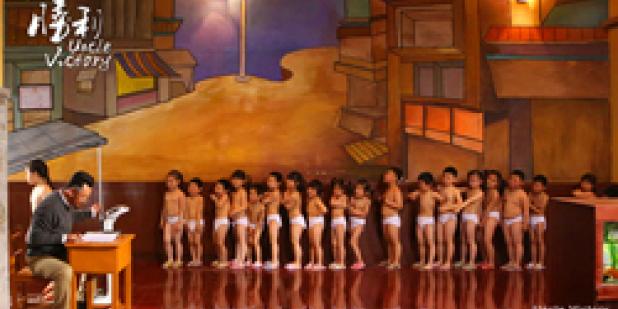Join us for a free one-day workshop for educators at the Japanese American National Museum, hosted by the USC U.S.-China Institute and the National Consortium for Teaching about Asia. This workshop will include a guided tour of the beloved exhibition Common Ground: The Heart of Community, slated to close permanently in January 2025. Following the tour, learn strategies for engaging students in the primary source artifacts, images, and documents found in JANM’s vast collection and discover classroom-ready resources to support teaching and learning about the Japanese American experience.
Uncle Victory 胜利
The UCLA International Institute presents the film, "Uncle Victory," as part of their 2014 China Onscreen Biennial: Spectrum.
Where

Spectrum
US Premiere 2014
Director: Zhang Meng
Producer: Ren Su
Screenwriter: Liu Ya
Cinematographer: Chou Shu
Production Designer: Fu Yingzhang
Editor: Qian Lingling Composer: Hou Wenbo, Wang Sa
Cast: Huang Haibo, Zhang Xinyi. Guo Xue
HDCAM, color, in Mandarin w/ English s/t, 97 min.
Uncle Victory occupies an original position in contemporary Chinese cinema. First, it’s always exhilarating to see a new talent confirmed, and Zhang Meng’s third feature upholds the promise of his previous film, festival darling The Piano in a Factory (2010). Returning to the rural settings, post-socialist empty lots and ruined factories of his native northeast, Zhang worked with a team of young Central Academy of Drama graduates, first-time producer Ren Su and screenwriter Liu Ya, to adapt the story of his uncle, a kindergarten owner who had gone to jail for 10 years for having crippled a man during an argument over money. Played with gusto by TV star Huang Haibo, Sheng Li is “a tough guy with a weakness for children,” released from prison into a country he no longer recognizes. He re-opens a kindergarten while settling old scores, and starting a complex romance with an equally tough young woman, Sun Xiaomen (Zhang Xinyi).
Second, while China has converted to digital media at a dazzling pace, Zhang Meng is the rare filmmaker who persists in shooting in 35mm to create the atmospheric texture he wants. Since Piano, he has teamed with a Director of Photography who shares his passion for shooting on film, Chou Shu, known in particular for his exquisite cinematography for artist Yang Fudong’s 35mm black-and-white films, and whose masterful camerawork turns the film into a visual poem, an elegy to the passing of time.
Third, despite receiving approval from the Film Bureau, Uncle Victory was subjected to a most unusual instance of censorship and unexpectedly barred from press and public screenings at the Shanghai International Film Festival, after Huang Haibo’s arrest for a sexual peccadillo became the rage on the Internet. Yet the producer was not allowed to withdraw the film, effectively denying it the prospect of being showcased at another major international film festival. Nonetheless, the seven members of the jury, presided by Gong Li, awarded it their Grand Prize. – Bérénice Reynaud
Zhang Meng (b. 1975, Liaoning) graduated from the Chinese Central Academy of Drama. His first feature, Lucky Dog (2008), made quite an impression at the Shanghai International Film Festival. The Piano in a Factory won the Grand Jury Prize at the Miami International Film Festival in 2011, and the award for best actor for Wang Qianyuan at the 23rd Tokyo International Film Festival.
Preceded by:
What Happened in Past Dragon Year
Featured Articles
Please join us for the Grad Mixer! Hosted by USC Annenberg Office of International Affairs, Enjoy food, drink and conversation with fellow students across USC Annenberg. Graduate students from any field are welcome to join, so it is a great opportunity to meet fellow students with IR/foreign policy-related research topics and interests.
RSVP link: https://forms.gle/1zer188RE9dCS6Ho6
Events
Hosted by USC Annenberg Office of International Affairs, enjoy food, drink and conversation with fellow international students.
Join us for an in-person conversation on Thursday, November 7th at 4pm with author David M. Lampton as he discusses his new book, Living U.S.-China Relations: From Cold War to Cold War. The book examines the history of U.S.-China relations across eight U.S. presidential administrations.




